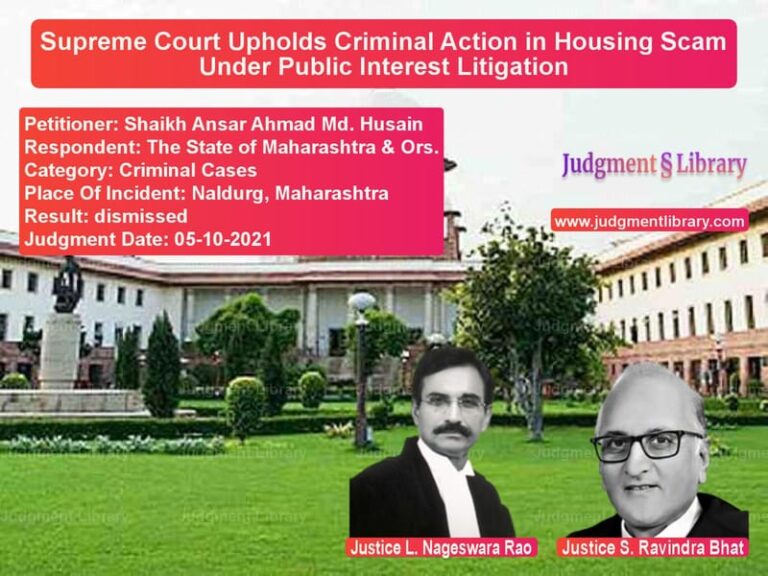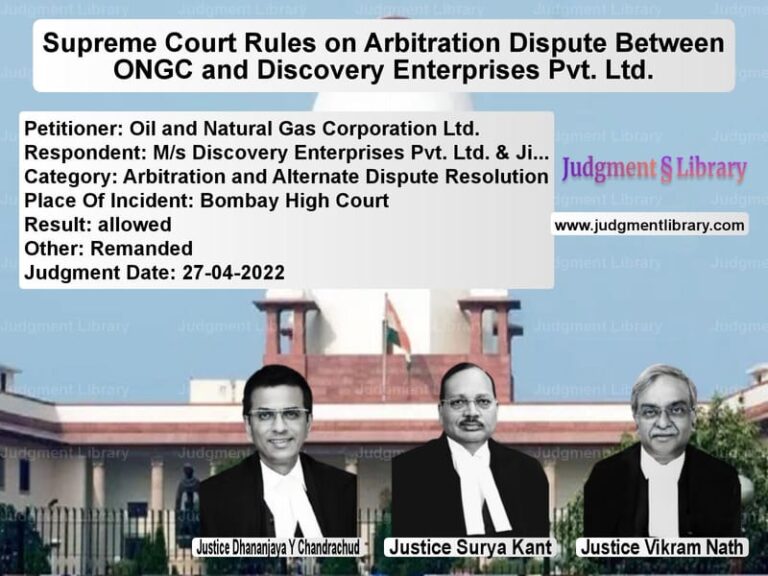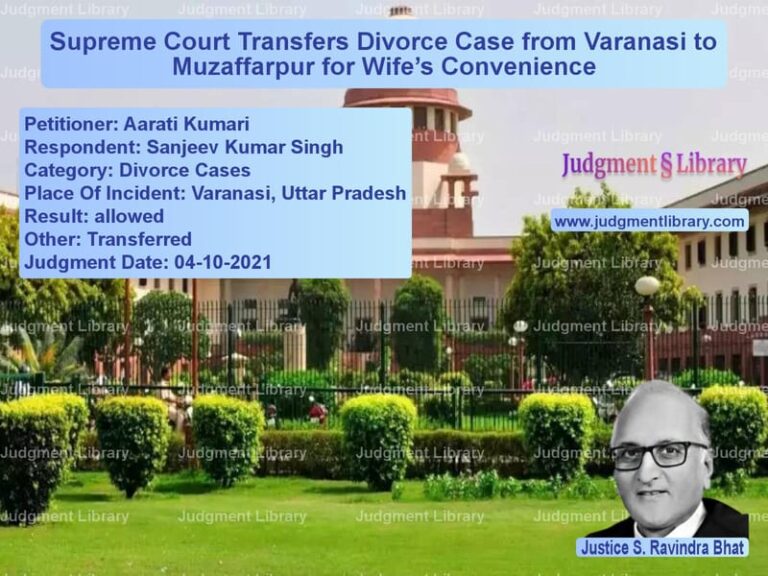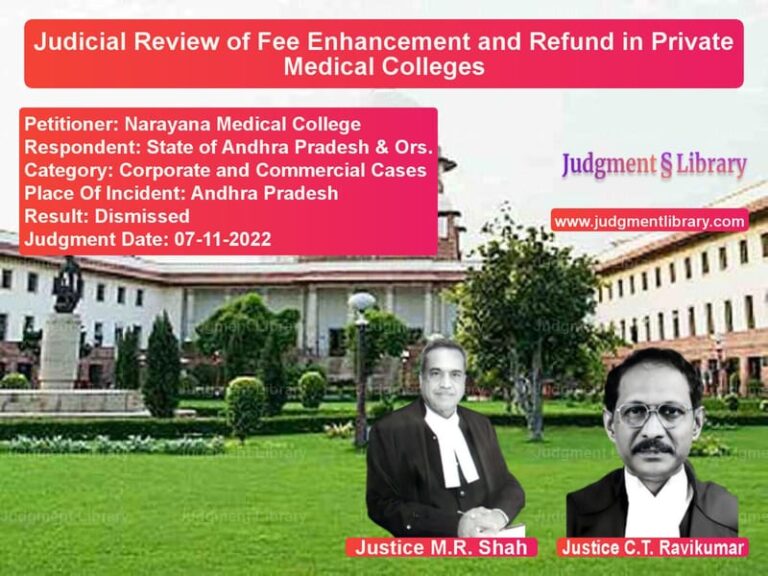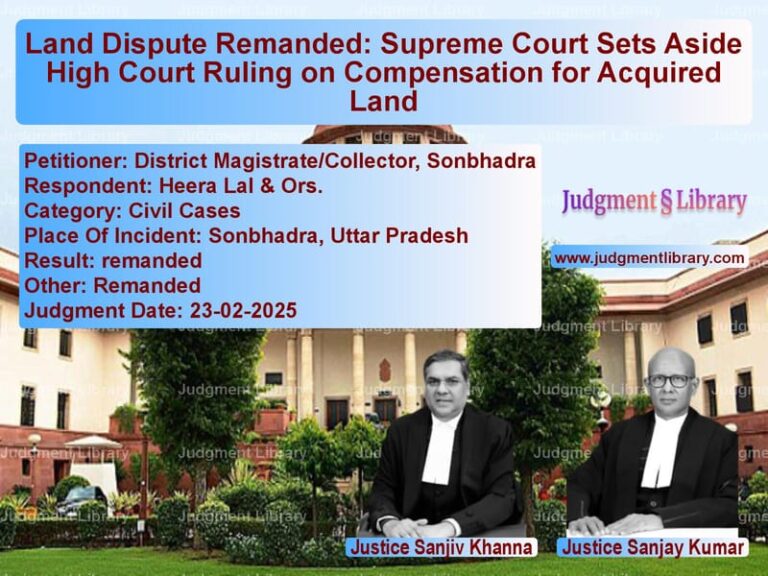Child Custody Battle After Mother’s Tragic Death: Supreme Court’s Landmark Judgment
The Supreme Court of India recently delivered a crucial judgment concerning the custody of a minor child following the tragic and unnatural death of her mother. The case revolved around the legal and emotional complexities of child custody when both paternal and maternal sides claimed guardianship. The judgment sheds light on the importance of prioritizing the welfare of the child over legal rights alone.
The case arose when the father and paternal grandparents of the child filed a writ of Habeas Corpus before the Madhya Pradesh High Court, seeking custody of the minor, who had been taken in by the maternal relatives. The High Court ruled in favor of the father and ordered the child’s transfer, but the matter was escalated to the Supreme Court, which took a more nuanced approach.
Background of the Case
The mother of the child passed away on December 27, 2022, in what was alleged to be an unnatural death by hanging. Following this incident, a First Information Report (FIR) was filed against the father and his parents under Sections 304-B and 498-A of the Indian Penal Code (IPC) and Sections 3 and 4 of the Dowry Prohibition Act, 1961. The allegations hinted at domestic violence and dowry-related abuse, leading to a severe legal tangle.
The child, who was merely 11 months old at the time of her mother’s death, was taken into custody by the maternal aunts and grandparents. The father, who was later arrested, was granted bail after the filing of the charge sheet. The father, along with his parents, approached the High Court under Article 226 of the Constitution, seeking the issuance of a writ of Habeas Corpus, contending that the maternal relatives had unlawfully taken the child and denied him custody.
Legal Proceedings and Arguments
Petitioners’ Arguments (Maternal Relatives)
- The maternal family contended that the child was taken into their custody in good faith after the mother’s death to ensure her safety and emotional stability.
- They argued that the father and paternal grandparents were facing criminal charges related to the mother’s death and hence, their custody could be detrimental to the child’s well-being.
- The petitioners asserted that the High Court had mechanically granted custody to the father without making an inquiry into the best interests of the child.
- The concept of parens patriae, where the court must act as the ultimate guardian of minors, was cited to emphasize the need for careful judicial scrutiny before transferring custody.
Respondents’ Arguments (Father and Paternal Grandparents)
- The father argued that, as the natural guardian under the Hindu Minority and Guardianship Act, 1956, he had the primary legal right to the custody of his child.
- It was contended that the maternal relatives had unlawfully taken the child without his consent and had obstructed his access to the child.
- The respondents relied on precedents where the Supreme Court had upheld the principle that a father, as the natural guardian, should have custody unless proven unfit.
- They also pointed out that depriving a child of their father’s presence could have long-term psychological repercussions.
Supreme Court’s Observations
Justice Abhay S. Oka, delivering the verdict, emphasized that:
“The High Court has not dealt with and considered the issue of the welfare of the child. The High Court has disturbed the child’s custody based only on the father’s right as a natural guardian.”
The Court made it clear that legal guardianship alone does not dictate custody decisions. Instead, the principle of “welfare of the child” takes precedence over all other considerations. The Court observed that since the child had been in the custody of the maternal relatives for over a year, an abrupt transition to the father’s custody could cause emotional distress.
Key Findings and Judgment
- The High Court’s order was set aside, and the Habeas Corpus petition was dismissed.
- The Supreme Court ruled that the case should be decided under the Guardians and Wards Act, 1890, rather than under Article 226.
- The father was granted supervised access to meet his child once every fortnight under the observation of a child psychologist.
- The maternal relatives were directed to file a formal application under the Guardians and Wards Act if they wished to retain custody.
- The decision reaffirmed that custody issues should not be mechanically decided based on legal rights but should always consider the minor’s emotional and physical well-being.
Implications of the Judgment
This case reaffirms a fundamental principle in child custody disputes—courts must consider the child’s best interests above all else. The judgment sets an important precedent for future cases where legal guardianship rights clash with concerns over a child’s emotional stability and safety.
The ruling ensures that custody disputes involving minors are not resolved merely based on legal statutes but also take into account psychological factors. The Supreme Court recognized that while a father has a primary legal claim to guardianship, the circumstances of the case warranted a more cautious approach.
Conclusion
The Supreme Court’s decision in this case highlights the evolving nature of custody laws in India. By dismissing the Habeas Corpus petition and emphasizing the necessity of a comprehensive evaluation of the child’s well-being, the judgment provides a well-balanced and humane approach to child custody disputes. It establishes that while a natural guardian has legal rights, these must be weighed against the larger question of the minor’s welfare.
Going forward, this ruling will serve as an essential guideline in cases involving custody battles, ensuring that the judiciary prioritizes the emotional and psychological welfare of the child over legal technicalities.
Petitioner Name: Somprabha Rana & Ors..Respondent Name: The State of Madhya Pradesh & Ors..Judgment By: Justice Abhay S Oka, Justice Augustine George Masih.Place Of Incident: Indore, Madhya Pradesh.Judgment Date: 06-09-2024.
Don’t miss out on the full details! Download the complete judgment in PDF format below and gain valuable insights instantly!
Download Judgment: somprabha-rana-&-ors-vs-the-state-of-madhya-supreme-court-of-india-judgment-dated-06-09-2024.pdf
Directly Download Judgment: Directly download this Judgment
See all petitions in Bail and Anticipatory Bail
See all petitions in Custodial Deaths and Police Misconduct
See all petitions in Judgment by Abhay S. Oka
See all petitions in Judgment by Augustine George Masih
See all petitions in partially allowed
See all petitions in Remanded
See all petitions in supreme court of India judgments September 2024
See all petitions in 2024 judgments
See all posts in Criminal Cases Category
See all allowed petitions in Criminal Cases Category
See all Dismissed petitions in Criminal Cases Category
See all partially allowed petitions in Criminal Cases Category


